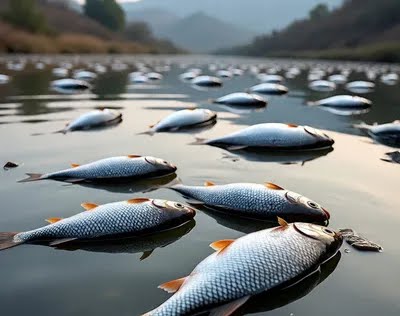Bandipora, Nov 8: Fishermen associations across north Kashmir’s Bandipora district have sounded the alarm over the mass deaths of fish in Wular Lake and the Jhelum River.The associations have accused the concerned departments and authorities, including law enforcement, of turning a deaf ear to their persistent pleas over the years.Members of the associations reached out to Greater Kashmir, raising concerns over the deaths of fish species, including snow trout and seedlings, in various parts of Wular Lake.They said that illegal and banned practices like the use of “electric shock” fishing were being employed for “almost a decade” here without halt, saying the issue had “increased” during the past few years.North Kashmir Fishermen Association President Ghulam Hassan said the practice was so lethal that a single shock could render “hundreds of kilograms of fish unconscious or dead at a time”.Moreover, man-made barriers and nets that restrict the movement of fish within Wular Lake and the Jhelum River were also highlighted as major concerns requiring immediate redressal.The association alleged that some “blue-eyed persons” within the community, who had managed to “evade law enforcement”, were using electric shock methods in areas like Nichyari, which serve as “breeding stock” zones for fish in March and April.They said the offenders use tubular batteries to hunt fish, a practice known as electro or dynamite fishing in coastal regions, which is drastically impacting aquatic life and threatening the long-term livelihood of fishermen.The death of fish has occurred on a massive scale. Anglers are sharing videos with us from as far as Sheer in adjoining Baramulla district and other nearby areas,” Naseer Ahmad Dar, an executive member of the fishermen’s body, told Greater Kashmir.The association said it had recently raised concerns with the Fisheries Department and the district administration.However, fishermen claimed their concerns were brushed off, with officials citing a “lack of manpower” and “little information” about the causes of the fish deaths.They said the department had failed to act on suggestions to impartially investigate the deaths through “laboratory testing” and other monitoring methods, leaving them uncertain about the future.They also criticised the Wular Conservation and Management Authority (WUCMA) for being “unconcerned despite their claim of conservation and protection of aquatic life in the lake”.Dar said some reports suggested the fish deaths were due to the discharge of chemicals into the Ganderbal water canal, “but no mass deaths have been reported from those places”.After raising the issue with the Additional Deputy Commissioner (ADC), who has been nominated as chair to investigate the matter, the association said the authorities “have sought evidence on electro-shock fishing”.Meanwhile, the association said that the Fisheries Department had expressed “helplessness” in removing the years-old barriers inside the lake, citing the need for “water JCBs” to do so.The association stressed that the “free movement of fish is necessary for the species to flourish, especially breeders”.Assistant Director of Fisheries Bandipora, Muneer Ahmad, said the department was doing everything within its capacity to curb illegal practices in Wular Lake and River Jhelum.He said the death of snow trout, a native Kashmiri species, was primarily “due to pollution” in the lake and the River Jhelum.He also admitted that some “blue-eyed persons”, habitual offenders accused of electro-shock fishing and enjoying “official patronage”, had been booked under two FIRs in Sumbal and Bandipora.On the issue of man-made willow barriers in Laharwalpora, he said the department had removed some portions earlier but required sophisticated machinery from Lake Conservation and Management Authority (LCMA) Srinagar to clear the remaining underwater structures, as it was “not possible by hand”.The official also cited a “dearth of manpower” in the department.He admitted the barriers were a hindrance to free fish movement and other pollutants arriving from the Jhelum and other water sources into the lake.Regarding the issue of breeding or immature fish being caught for sale across markets, he said the department was acting strictly and releasing them back into the water wherever they spotted the practices were being conducted.The official acknowledged that gill nets were being “used in abundance”, adding that their use had increased manifold since the local ban on them was repealed after 2019.“Despite that, we are almost on a daily basis seizing nets and charge-sheeting offenders so that their use is kept to a minimum,” he said.

Fishermen report mass fish deaths in Wular, Jhelum
by
Tags:
Leave a Reply